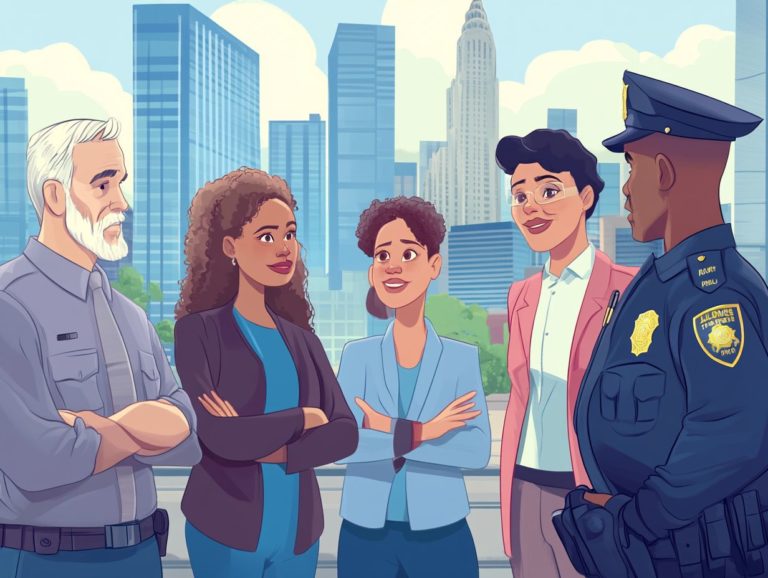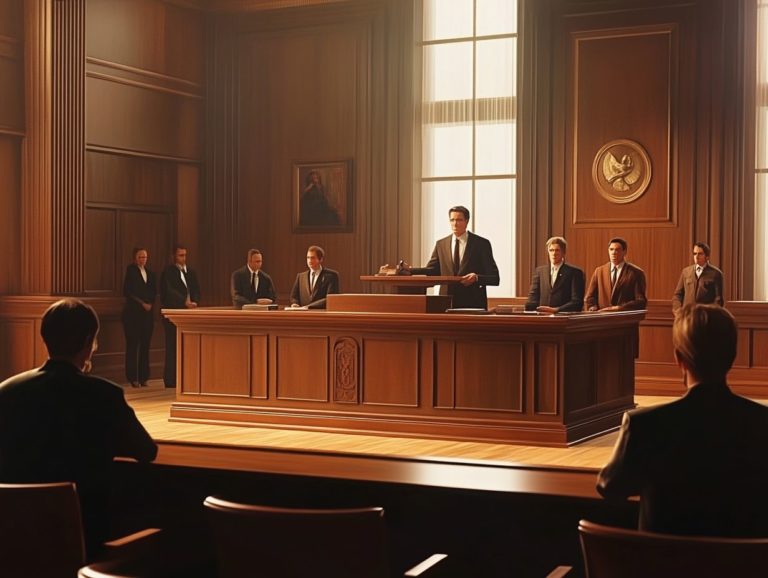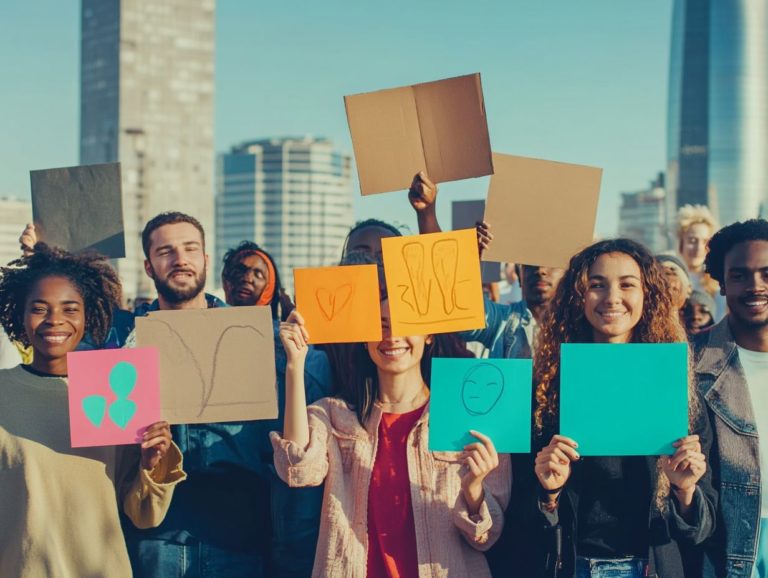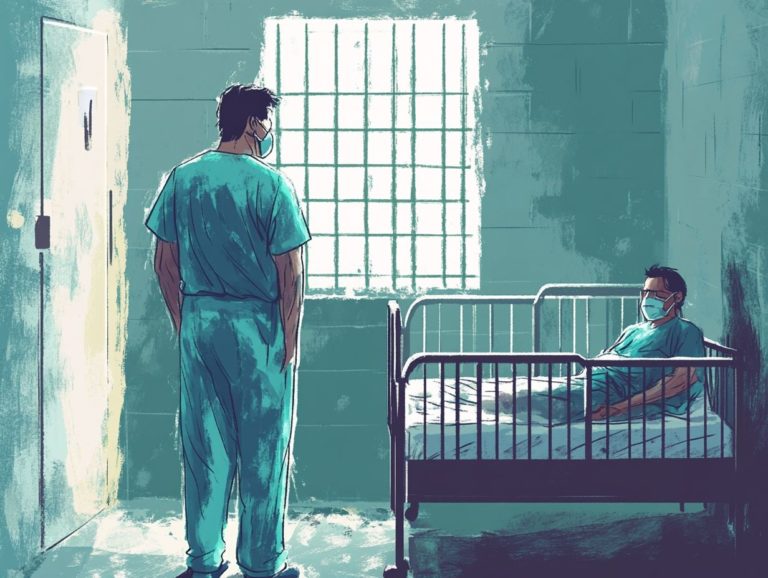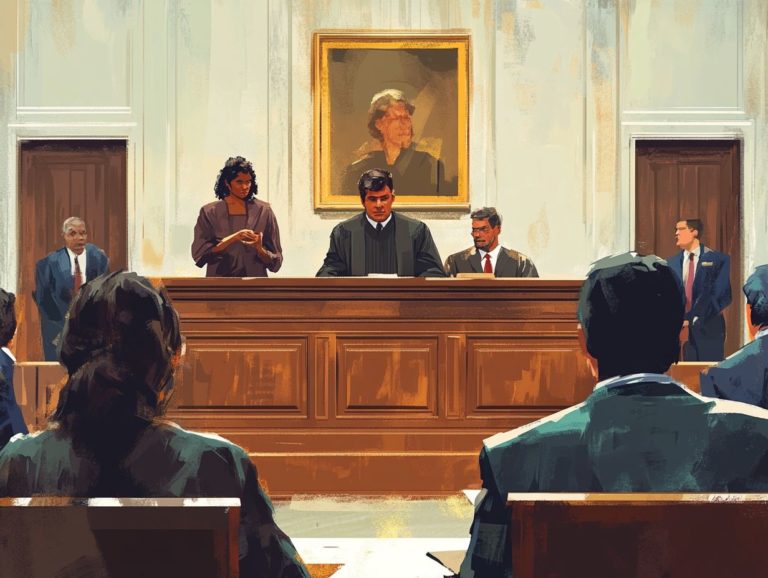How Rights of the Accused Vary by Crime
Understanding the rights of the accused is essential for navigating the intricate landscape of the legal system. This overview will illuminate how these rights change based on the crime ranging from violent offenses to white-collar crimes and drug-related charges.
You ll discover the limitations that may arise and gain valuable insights on how to protect and effectively exercise your rights. Together, let s delve into this crucial aspect of criminal justice.
Contents
- Key Takeaways:
- Rights of the Accused: An Overview
- Rights of the Accused for Different Crimes
- Limitations to Rights of the Accused
- How to Protect and Exercise Rights of the Accused
- Frequently Asked Questions
- What are the basic rights of the accused in any criminal case?
- How do the rights of the accused vary by crime?
- Do the rights of the accused differ in different countries?
- What additional rights may the accused have in certain crimes?
- Do the rights of the accused apply to juveniles?
- Can the rights of the accused be waived?
Key Takeaways:
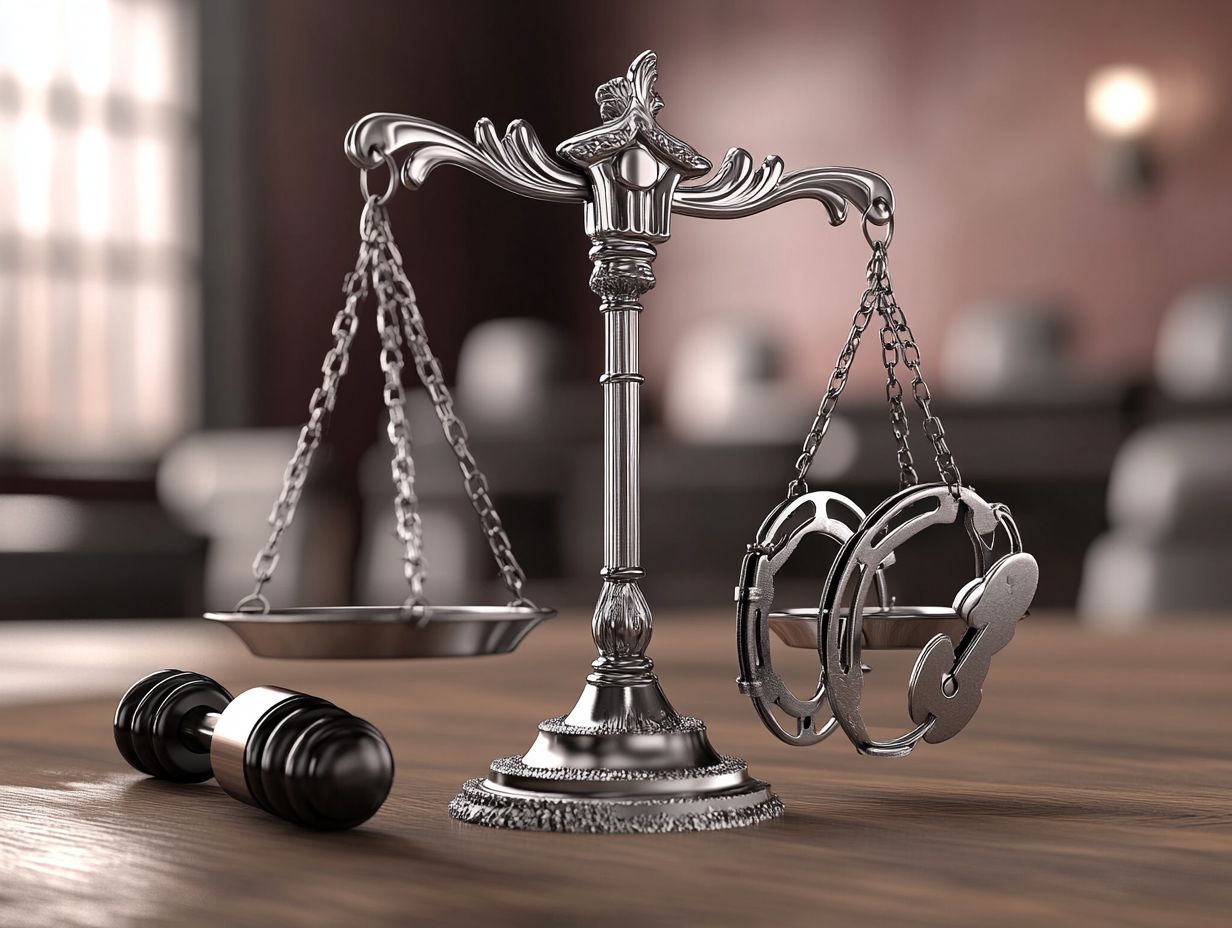
- The rights of the accused change based on the crime.
- Different protections apply for crimes against persons, property, white-collar crimes, drug offenses, sex crimes, and domestic violence.
- Limitations to these rights can impact legal representation and resources.
- To protect and exercise their rights, the accused should seek legal representation and utilize available resources.
- Understanding the legal process is crucial for ensuring rights are upheld.
Rights of the Accused: An Overview
The rights of the accused are a cornerstone of justice within the criminal justice system. They provide essential legal protections that uphold the presumption of innocence until proven guilty.
These rights are established in the U.S. Constitution through the Fifth, Sixth, and Eighth Amendments. They include the right to a fair trial, legal representation, and protection against unreasonable searches.
Knowing these rules is vital for safeguarding your freedoms when facing criminal charges. This knowledge helps prevent wrongful convictions and preserves the integrity of judicial systems not only in the U.S. but also in countries like Canada, France, and Germany.
Understanding the Legal Process
Understanding the legal process is crucial for your future, whether you’re the accused or simply a concerned member of the public. It lays the foundation for protecting rights throughout a criminal trial.
The legal framework establishes procedures that ensure you have a fair chance to present your defense, challenge the prosecution’s evidence, and seek legal representation to navigate the complexities of the judicial system.
Your journey begins with an arrest, where law enforcement detains you based on probable cause, meaning they have a reasonable belief that you committed a crime. Following this, the arraignment gives you a formal opportunity to enter a plea, setting the stage for upcoming hearings.
Each hearing is critical for you to evaluate evidence and witness testimonies. This allows your defense to scrutinize the prosecution’s case.
The trial is the culmination of these efforts. Both sides argue their points passionately before a judge or jury. If disagreements arise regarding the trial’s outcome, the legal process allows you to appeal. This safeguards your rights and ensures that the pursuit of justice remains a priority.
Rights of the Accused for Different Crimes
The rights of the accused can differ greatly based on the type of crime. Specific legal protections are established for various categories, including crimes against persons, property crimes, white-collar offenses, drug-related offenses, sex crimes, and domestic violence.
It is essential for you to understand these rights. This ensures that anyone facing allegations receives appropriate legal representation and fair treatment within the judicial system. This knowledge helps uphold their fundamental rights, no matter the charges they encounter.
Crimes Against Persons
Crimes against persons, like assault and homicide, bring forth specific rights for you as the accused. These rights are particularly important concerning your legal representation and protections during trial proceedings.
The legal framework ensures that you have a fair opportunity to contest the charges against you, thereby upholding your fundamental rights within the judicial system.
This protection highlights the importance of having competent legal counsel. It guarantees that any evidence presented in court adheres to strict standards of admissibility. The presence of a skilled attorney can significantly influence the outcome, as they expertly navigate the complexities of legal procedures and advocate for your rights.
Numerous judicial safeguards, such as the presumption of innocence and the right to a fair trial, are in place to mitigate potential biases against defendants. Together, these elements work harmoniously to preserve the integrity of the justice system and protect the rights of individuals accused of serious offenses.
Don’t wait! Protect your rights by consulting a legal expert today!
Crimes Against Property
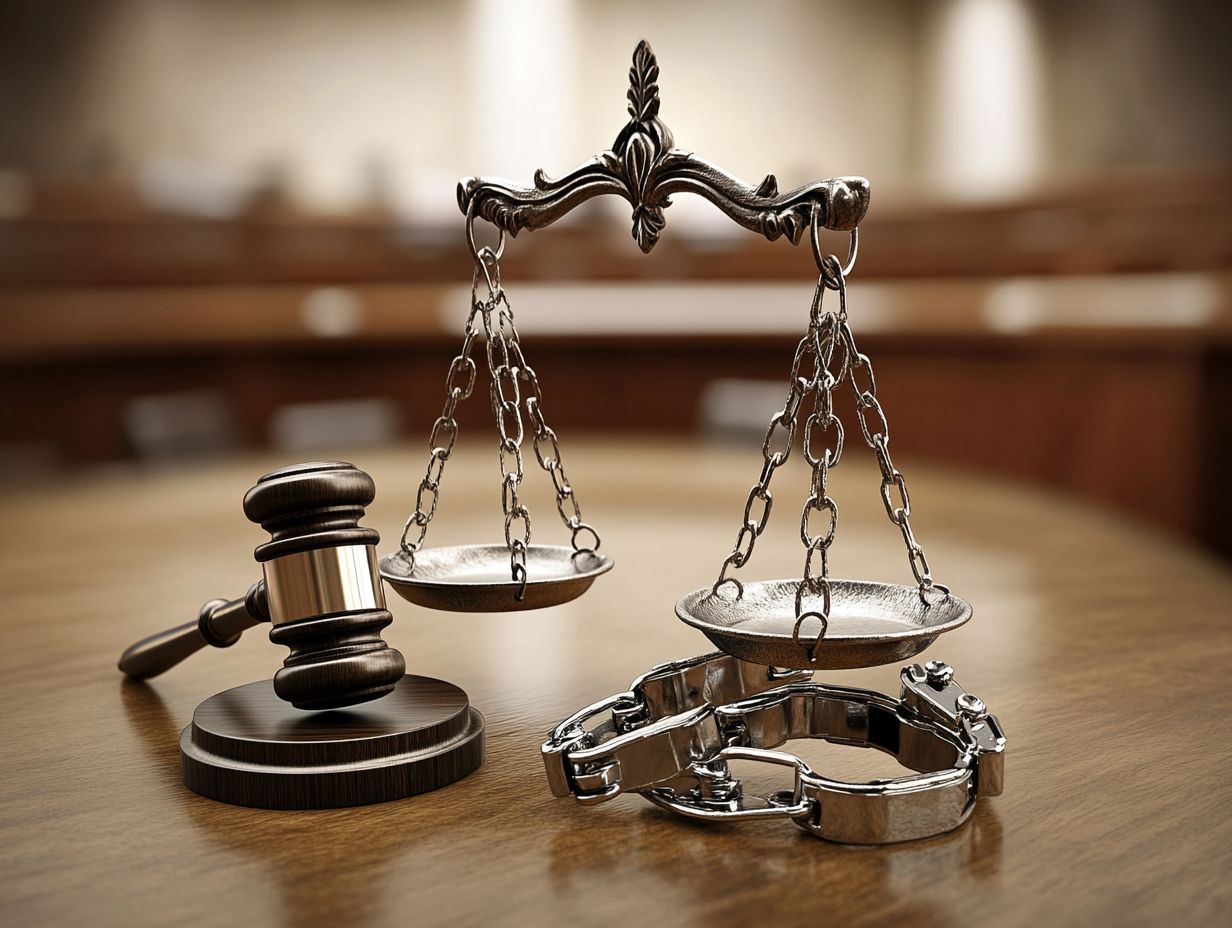
In cases of property crimes, such as theft or vandalism, your rights as the accused are paramount in ensuring that legal protections and due process are upheld throughout the prosecution. This framework is designed to balance the interests of both victims and defendants, preserving a fair judicial process.
The legal system s commitment to safeguarding these rights embodies the fundamental principle that you are presumed innocent until proven guilty. This principle not only protects you from wrongful conviction but also enhances public trust in the judicial process.
By guaranteeing access to legal representation and the opportunity to contest evidence, the judicial system reinforces the notion that justice should prevail for everyone involved.
These measures also have broader societal implications, as they uphold the rule of law and deter arbitrary enforcement of laws, thereby reinforcing a just legal framework for all.
White Collar Crimes
White collar crimes, often involving fraud and embezzlement, pose distinct challenges and rights for you as the accused during legal proceedings. The complexities of these cases demand strong legal representation to navigate the intricate trial process and ensure your rights receive the protection they deserve.
As someone facing such allegations, you have important rights, including the essential right to legal counsel. This ensures you have expert guidance throughout your defense.
The evidence brought against you must meet stringent legal standards, highlighting the necessity of fair and thorough investigations.
Upholding a fair legal process is crucial, as it guarantees that every aspect from arrest to trial is conducted fairly, allowing you the opportunity to contest the evidence and advocate for your innocence in a just manner.
Drug Offenses
In drug offense cases, your rights take center stage, as legal protections are essential for securing a fair trial against a backdrop of intense prosecution. You re entitled to legal representation and the opportunity to challenge the evidence brought against you.
You benefit from the Fourth Amendment, which shields you from unreasonable searches and seizures. This means that police must have a valid reason before searching you or your property. This protection is crucial, ensuring that your personal privacy is respected and that any unlawfully obtained evidence is often deemed inadmissible in court.
The framework of a fair legal process guarantees that you receive notice of the charges against you and the chance to present your defense. These vital rights uphold the integrity of the judicial process, enabling you to navigate the intricate legal landscape with confidence when facing drug-related allegations.
Sex Crimes
Facing such serious accusations? It’s vital to protect your rights and secure expert legal help! Accusations of sex crimes come with a heavy burden of social stigma, making it crucial for you to understand the importance of protecting the rights of the accused.
Access to competent legal representation is essential for navigating the intricate landscape of these sensitive cases. This access is not just about familiarizing yourself with the legal procedures; it s also about safeguarding your rights throughout the investigation and trial.
Due process stands as a fundamental pillar of a just society, guaranteeing that every individual, no matter the charges, is treated fairly under the law.
Public perception can have a profound impact on the judicial process. An accused individual often faces prejudgment or social exclusion, which can cloud the factual determinations made in the courtroom.
Therefore, upholding the rights of those accused is paramount in preserving the integrity of the judicial system and ensuring that true justice is served.
If you or someone you know is facing these serious charges, don’t hesitate reach out to a legal expert today!
Domestic Violence
Domestic violence cases require a careful balance between protecting victims and respecting the rights of the accused. This balance is essential for maintaining a fair judicial process.
As the accused, you have important rights, such as the presumption of innocence and the right to confront witnesses. These rights are vital for a fair trial.
It s crucial to gather and present evidence to establish the truth. Without legal protections, the risk of wrongful judgments increases, threatening the principles of justice.
These misjudgments can have long-lasting effects on society’s perception of legal proceedings related to domestic violence.
Other Types of Crimes
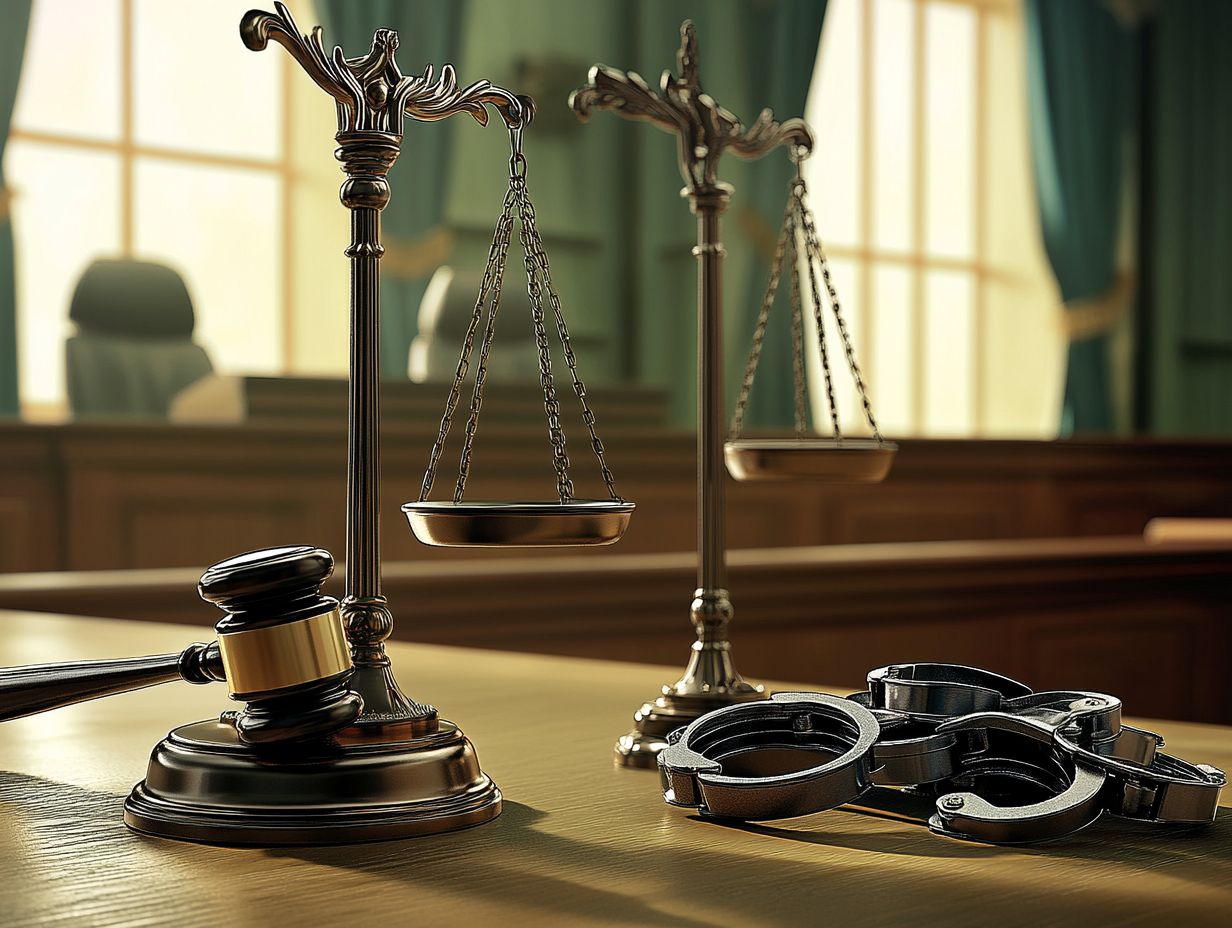
Different types of crimes have significant implications for your rights as an accused individual. Understanding the rights of the accused is essential to ensure fair trial protections and proper representation.
Understanding these nuances helps maintain the integrity of the judicial system. From white-collar crimes like fraud to violent offenses like assault, the landscape of criminal law is intricate.
Each type of crime comes with specific rights related to representation and due process. For serious allegations, you often receive mandated legal counsel to help navigate the complexities of the law, including understanding the rights of the accused.
This balanced approach fosters fairness and bolsters public confidence in the legal system designed to protect individual rights.
Limitations to Rights of the Accused
While the rights of the accused are essential for upholding justice, know that there are limits on these rights within the legal system. These limits can influence your rights during a trial.
Understanding these complexities is crucial for both defendants and legal professionals navigating criminal law.
Exceptions and Restrictions
Exceptions to the rights of the accused often arise in specific legal contexts, such as national security concerns or threats to public safety. In these cases, a delicate balance must be struck between individual rights and societal safety.
For example, in terrorism cases, authorities may use surveillance methods that infringe on personal privacy to prevent possible attacks. Similarly, during civil unrest, law enforcement might exercise emergency powers to detain individuals, raising critical questions about due process.
These exceptions are not taken lightly; they adhere to established legal standards and are often subject to judicial review. Examining these scenarios reveals the inherent tension in the justice system as it seeks to protect individual liberties while responding to urgent societal needs.
How to Protect and Exercise Rights of the Accused
Protecting and exercising the rights of the accused is essential for ensuring justice and fairness in the legal system. This requires understanding how to access legal representation and the resources available to you.
By familiarizing yourself with your rights, you can navigate the judicial process more effectively and advocate for due process throughout your trial.
Legal Representation and Resources
Access to good legal representation is crucial. It helps you navigate the judicial system and protect your rights.
Legal aid organizations and criminal defense lawyers are valuable allies in seeking justice. They provide insights into the complexities of the law and keep you informed at every stage of your case.
Skilled lawyers advocate for you and protect your rights. They also help ensure you have access to due process, enhancing the integrity of the judicial system.
Frequently Asked Questions
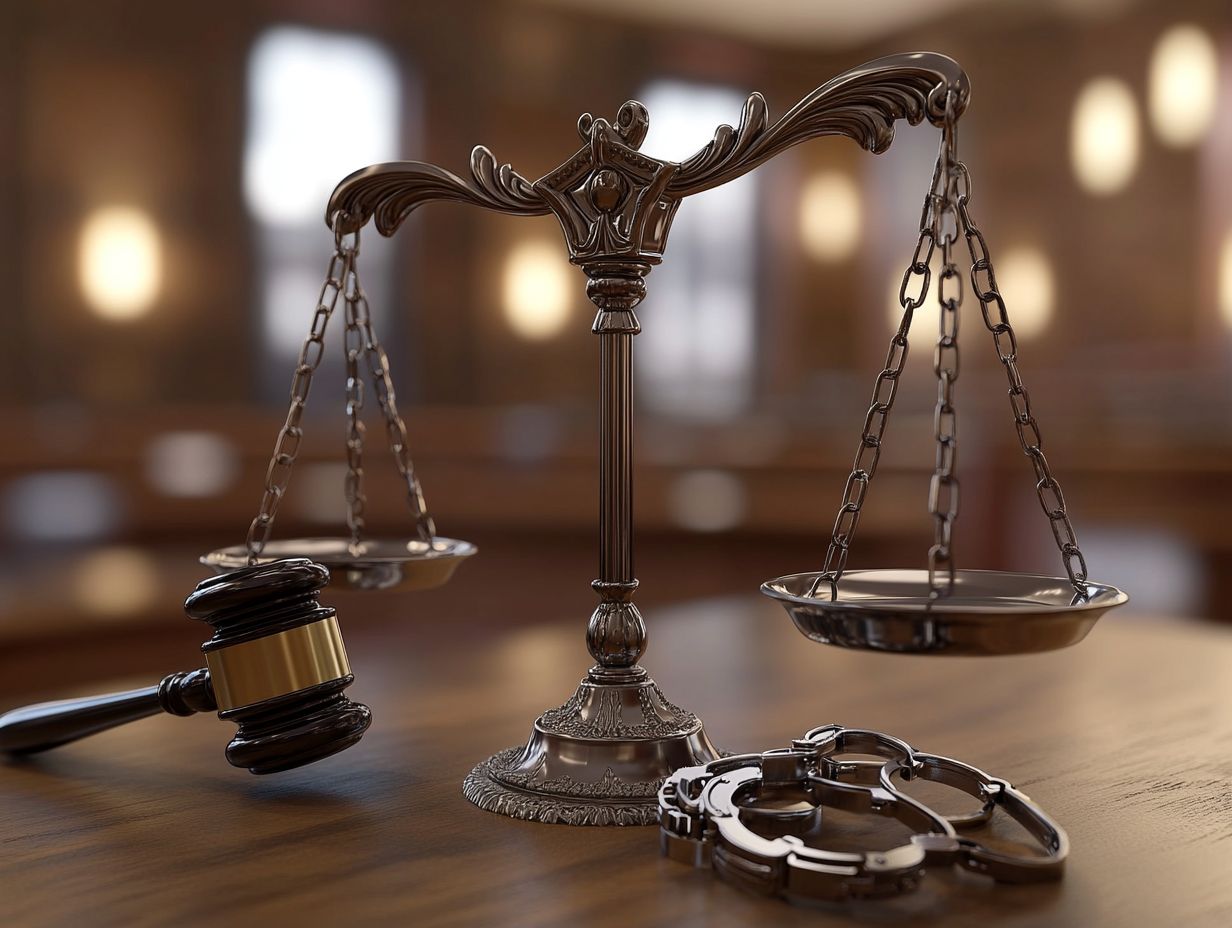
What are the basic rights of the accused in any criminal case?
The basic rights of the accused include the right to a fair trial and the right to an attorney. You are presumed innocent until proven guilty.
How do the rights of the accused vary by crime?
Rights can vary based on the crime’s severity and the jurisdiction’s laws. For example, someone accused of a minor crime may have fewer rights than someone accused of a serious felony, as outlined in the rights of the accused in different states.
Do the rights of the accused differ in different countries?
Yes, rights differ by country due to various legal systems. For a deeper understanding, you can explore the rights of the accused, as some countries offer more protections for the accused than others.
What additional rights may the accused have in certain crimes?
In some cases, the accused may have the right to a jury trial and the right to remain silent. They can also present evidence and witnesses.
Do the rights of the accused apply to juveniles?
Yes, juveniles have certain rights, though they may differ from adults. For instance, they can have legal representation and their guardians present during questioning.
Can the rights of the accused be waived?
Yes, rights can be waived voluntarily and with a full understanding of the consequences. This may happen during plea negotiations or if someone chooses to represent themselves.

